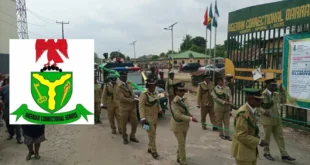NAFDAC Recruitment 2025 portal and how to apply on www.nafdac.gov.ng. This article will provide information on NAFDAC recruitment portal 2025, application requirements, starting date for the recruitment and deadline including the details on the NAFDAC recruitment form and how to apply. The National Agency for Food and Drug Administration and Control …
Read More »NDDC Recruitment 2025/2026 Application Form Portal | www.nddc.gov.ng
NDDC Recruitment 2025 portal and how to apply on www.nddc.gov.ng. This article will provide information on NDDC recruitment portal 2025, application requirements, starting date for the recruitment and deadline including the details on the NDDC recruitment form and how to apply. The Niger Delta Development Commission recruitment 2025 will commence …
Read More »Nigerian Prison Service Recruitment 2025/2026 Application Form Portal (www.cdcfib.gov.ng)
The Nigerian Correctional Service (NCoS), formerly known as the Nigerian Prison Service, has announced its highly anticipated recruitment exercise for 2025. We will provide all the essential information you need to successfully apply for available positions within Nigeria’s correctional system. Organization: Nigerian Correctional Service (NCoS) Conducting Body: Civil Defence, Correctional, …
Read More »NNPC Recruitment 2025/2026 Application Form Portal | www.careers.nnpcgroup.com
NNPC Recruitment 2025 portal and how to apply on www.careers.nnpcgroup.com. This article will provide information on NNPC recruitment portal 2025, application requirements, starting date for the recruitment and deadline including the details on the NNPC recruitment form and how to apply. The Nigerian National Petroleum Corporation recruitment 2025 will commence …
Read More »Nigeria Police Recruitment 2025/2026 Application Form Portal | www.policerecruitment.gov.ng
Nigeria Police Recruitment 2025 application form is now officially out and available on the portal at www.policerecruitment.gov.ng. If you are interested in joining the Nigeria Police Force (NPF), this is your opportunity to take part in the 2025/2026 recruitment exercise. This page explains everything you need to know about the …
Read More »Nigeria Police Shortlisted Candidates Names 2025/2026 Check List
Nigeria Police Shortlisted Candidates 2025 is now online for all candidates to check the list. NPF Shortlisted names full list in PDF you can download on www.policerecruitment.gov.ng. This page will show you how you can easily check Nigeria Police shortlist 2025 on the portal. We understand you visited this website …
Read More »INEC Recruitment 2025/2026 Application Form Portal | www.inecnigeria.org
INEC Recruitment 2025 portal and how to apply on www.inecnigeria.org. This article will provide information on INEC recruitment portal 2025, application requirements, starting date for the recruitment and deadline including the details on the INEC recruitment form and how to apply. The Independent National Electoral Commission recruitment 2025 will commence …
Read More »Nigerian AirForce Shortlisted Candidates 2025/2026 List PDF
Nigerian Airforce Shortlisted Candidates 2025/2026 NAF shortlisted names 2025 is now available for you to check at nafrecruitment.airforce.mil.ng portal. You can check Airforce shortlist 2025 now by using the portal. Are you among those that applied for NAF Recruitment 2025? Check Airforce shortlisted names 2025 using our website and you …
Read More »Nigeria Immigration Service Recruitment 2025/2026 NIS Application Form Portal
The Nigeria Immigration Service (NIS) has officially announced the commencement of its 2025 recruitment exercise as part of the Civil Defence, Correctional, Fire and Immigration Services Board (CDCFIB) nationwide recruitment. This is the information you need to successfully apply for the Nigeria Immigration Service recruitment 2025. Available Positions and Career …
Read More »Nigerian Correctional Service Recruitment 2025/2026 Application Form Portal
The Nigerian Correctional Service has officially opened its 2025 recruitment portal, calling on suitably qualified Nigerians to apply for various vacant positions. We will state everything you need to know about the Nigerian Correctional Service recruitment 2025, including eligibility criteria, application procedures, and important deadlines. The Nigerian Correctional Service, formerly …
Read More » SOSAN.ORG.NG Latest Recruitment and Jobs in Nigeria
SOSAN.ORG.NG Latest Recruitment and Jobs in Nigeria







